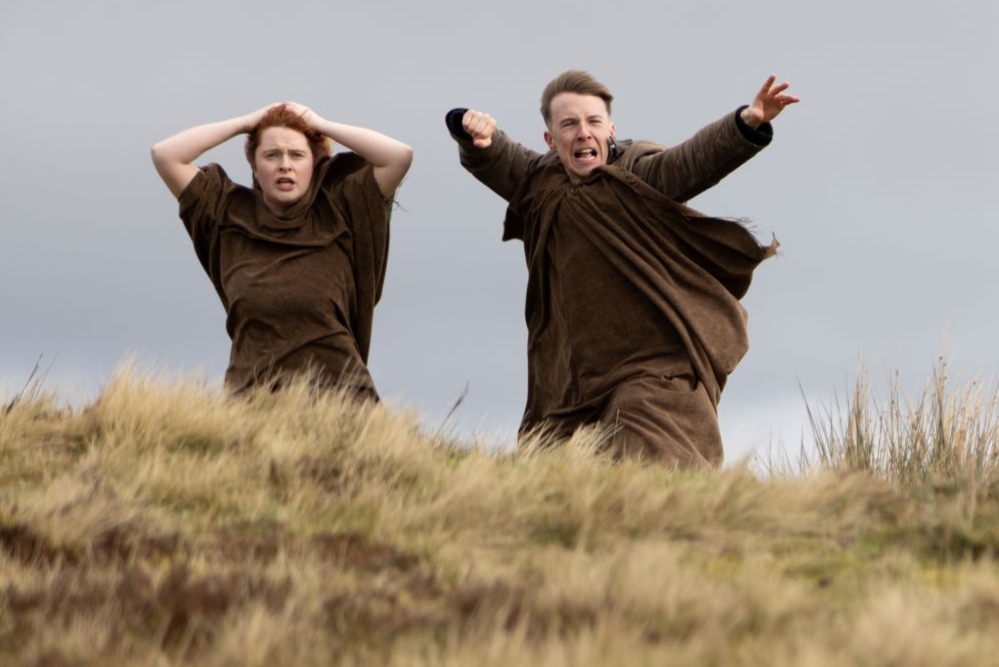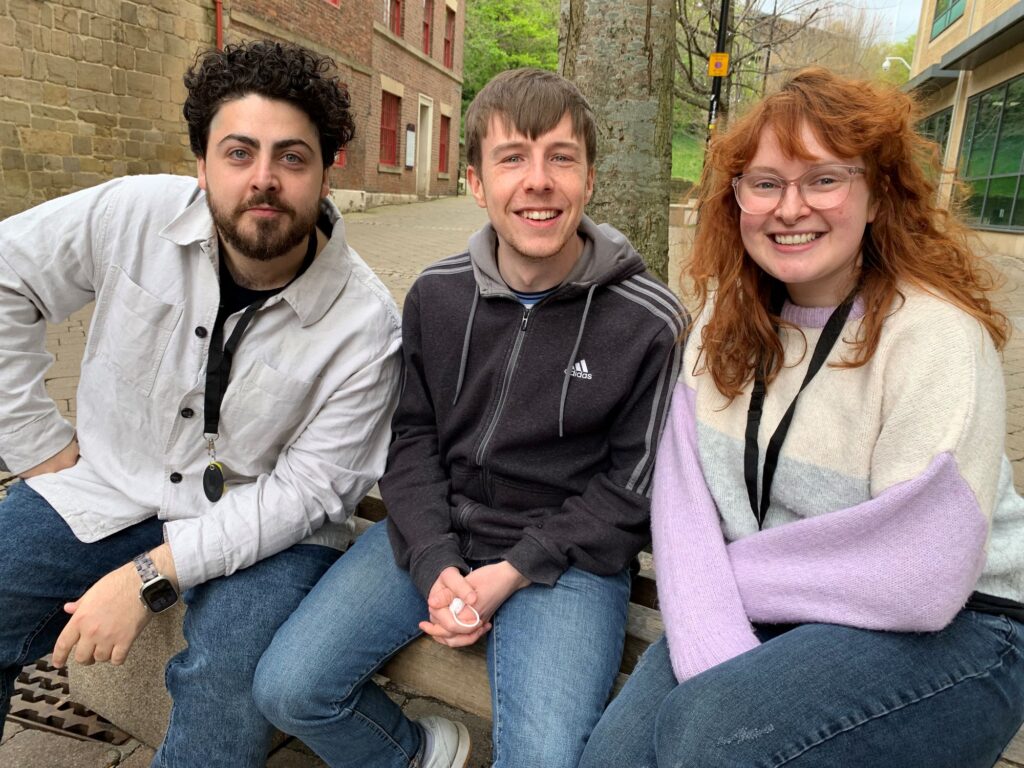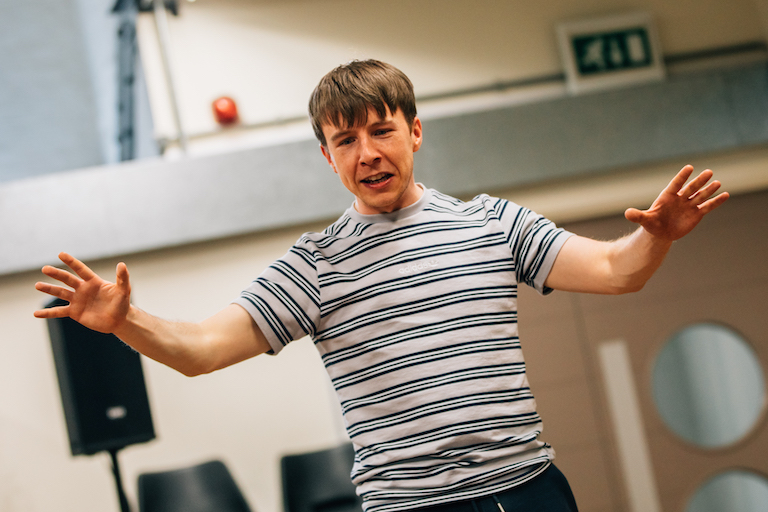
Three young actors are feeling their way into the characters they’ll embody in The Bounds, a play set in Northumberland in 1553.
This, according to Live Theatre, was ‘the true golden age of English football’, although its further assertion that ‘men will die today’ raises doubts about that.
Ryan Nolan and Lauren Waine play Percy and Rowan who are outliers in the Allen Valley Whitsun Game, positioned on the periphery of a brutal forerunner of the beautiful game.
“It’s a brilliant North East story with the backdrop of mediaeval football and regional identity,” says Ryan who last appeared at Live Theatre in 2022 in the tough prison drama, One Off.
“There’s a fun friendship between Percy and Rowan and then Soroosh’s character arrives and causes chaos.”
- Read more: Laughter and tears from The Olive Boy
- Read more: Durham’s Fringe is growing
That’s the enigmatic Samuel, played by Soroosh Lavasani, who lives in London but grew up on Teesside and is returning to the theatre where last year he took part in a 50th-anniversary read-through of Alex Oates’s play, The Filleting App.
Of Samuel, he says: “The less said about my character the better, probably. I’m from somewhere else. I’m ‘other’.”
The world of Percy and Rowan — ‘Tudor radgies’, according to Ryan — doesn’t extend beyond the untamed patch of 16th-century Northumberland where the play is set.
“Percy’s world is Allendale, his friends and how he survives the day,” says the actor charged with bringing him to life.
Lauren, originally from Sunderland, is delighted to be making her first professional appearance at Live Theatre where she was once in the youth group.
Recently she played Blyth Spartans heroine Bella Reay in another football-related play, Wor Bella, but this is a very different ball game, born of the imagination rather than documented fact.

Percy and Rowan, says Lauren, are outcasts and ‘rubbish’ at what passed for football in the 16th-century Allen Valley.
“Worse than rubbish,” corrects Ryan.
Rowan, in Lauren’s estimation, is an exceptional young woman, the only female participant in the Whitsun game. “She’s definitely not your classic 16th Century lady,” she says.
Ryan, not long into rehearsal, is getting a sense of a play that feels ambitious and refreshingly different: “I feel sometimes we revert to type in stories about the North East.
“This feels like it’s about things in the North East that are true but there’s a massive dollop of wonder in there. It’s about history and place and things that are brilliant and sometimes less than brilliant.”
Soroosh warns: “Whatever the audience thinks they’re stepping into might turn out to be something very different by the end of the play.”
To have this on here, with family and friends able to see it, feels like coming full circle. I’m thrilled it’s on in a theatre I love and in a city I love
Stewart Pringle, playwright
All three — to be joined each night by either James Green or Nathaniel Campbell-Goodwin, youngsters sharing a fourth role — are excited that the play is to transfer to London’s Royal Court Theatre.
Equally chuffed is the man who wrote The Bounds, Stewart Pringle, also London-based but returning to his roots with this play.
“It’s an absolute dream come true,” he says.
“I still hope to move back some time but I’m conscious of having been away for quite a long time.
“To have this on here, with family and friends able to see it, feels like coming full circle. I’m thrilled it’s on in a theatre I love and in a city I love.”

Stewart grew up in the North Pennines village of Allendale where his family has lived for generations.
His father, recently retired, ran the garage. His uncle took over the Co-op from Stewart’s grandfather who also tended the cemetery.
The famous New Year’s Eve ritual, whereby local men dubbed ‘guisers’ parade with flaming tar barrels, adds to Allendale’s time-honoured mystique.
“I’ve been there every New Year’s Eve for my entire life,” says Stewart.
“In London my mates will be working out which parties to go to but it’s always easy for me.
- Read more: All aboard for The Last Cage Down
- Read more: Orchestral manoeuvres in the North
“My dad and grandad were involved with the guisers in what’s almost a mummer tradition. That was a big part of growing up.
“I’m writing a play about it at the moment, whether through homesickness or what.”
Stewart’s ‘day job’ is at the National Theatre, as a senior dramaturg helping to make scripts workable on stage, but how did a lad from Allendale become so steeped in this world?
He recalls a couple of seminal figures.
At Allendale School, aged about 10, Stewart was involved in a project led by Cullercoats playwright Peter Mortimer.
“He worked with the class to write a play based on what interested us. It was called Whiter Than White and was about the National Lottery, which had just started.
“A family moved from an estate in Newcastle to a big fancy house when they won the lottery. I played the dad and it was the most exciting thing I’d ever done.

“We performed it in the Queen’s Hall in Hexham and went on BBC Radio. It took up most of a year and we felt as if we were doing a professional theatre show.”
Progressing to Haydon Bridge High School, Stewart fell under the wing of inspirational drama teacher Mike Fry who had loved Whiter Than White.
Stewart recalls: “He directed all the school plays and fostered my enthusiasm. He lent me books and became a bit of a mentor.
“Partly subsidised out of his own pocket, he started organising trips to Newcastle. We came to see shows at Live and the RSC (Royal Shakespeare Company) at the Theatre Royal.
“We saw a lot of Alan Lyddiard’s plays at Northern Stage. I liked films, especially horror films, but Nineteen Eighty-Four, Animal Farm and A Clockwork Orange were better than any I’d seen. They had an incredible impact on me.”
When Mike Fry died in 2009, Stewart spoke at his memorial.
No-one in Stewart’s family had been to university but he got into Oxford — for which he credits his mother who instilled a love of books — and became steeped in its theatre scene to such an extent that he was called before the Warden, the formidable Dame Jessica Rawson.
“She said, ‘Somehow, people who do rowing and things still manage to complete their degrees but people who do drama often go awry’.
“I did finish my degree but maybe with not such close focus as I otherwise would have had.”

After imposing on himself a drama-free year in Cambridge, studying for a Master’s in American literature, Stewart moved to London and was reunited with his theatre-loving mates.
They set up a company specialising in plays of horror and suspense. When the translations of French shockers in the ‘grand guignol’ tradition ran out, Stewart started writing his own.
“We ran it for four years on a shoestring and it was fun. We had some success with it although some plays were better than others. We spent a lot of time in the pub.”
Stewart’s first full-length play, The Ghosthunter, opened in 2013 at London pub theatre The Old Red Lion and toured widely for a year.
It encouraged him to take his writing more seriously but also to apply to run The Old Red Lion Theatre which he did for three years.
His second play, Trestle, a romantic comedy featuring an older couple who meet in a village hall, won the 2017 Papatango New Writing Prize.
He started The Bounds shortly afterwards, in 2018, somewhat inspired by Brexit turmoil and the chaos of mediaeval Shrovetide football matches, but ‘got completely stuck’.
Stewart says: “I knew it was going to be about 16th-century football and I had these two characters I was quite pleased with, and this idea of a third character arriving. But I didn’t know where it would go.”
It was during lockdown that he was inspired to pick it up again.
“This is absolutely not a play about Brexit but I know a lot of hill farmers were pro-Brexit and then quite upset when they saw what the consequences would be.
“I became interested in how far people in Allendale are, even now, from decisions made at the heart of government.”
Ideas about political change and football and fanaticism began to coalesce around his evolving script.
“I’m a fan of all sorts of things although I was terrible at football so was always positioned where I could do least damage.
“I started looking at what it means to be on the outside with little ability to affect something whose consequences mean a lot to you.”
Stewart’s script got longlisted for a couple of awards. Then Jack McNamara, Live’s Artistic Director, got in touch and asked to direct it.
To pinch a football phrase, Stewart was over the moon. He warns, though, that The Bounds is not a football play in any conventional sense.
“I don’t think there’s even a ball,” he muses.
The Bounds kicks off at Live Theatre on Thursday, May 16 and it runs until June 8. Tickets are available from the theatre website. Alternatively, you can catch it in London from June 13 to July 13 at the Royal Court Theatre.











